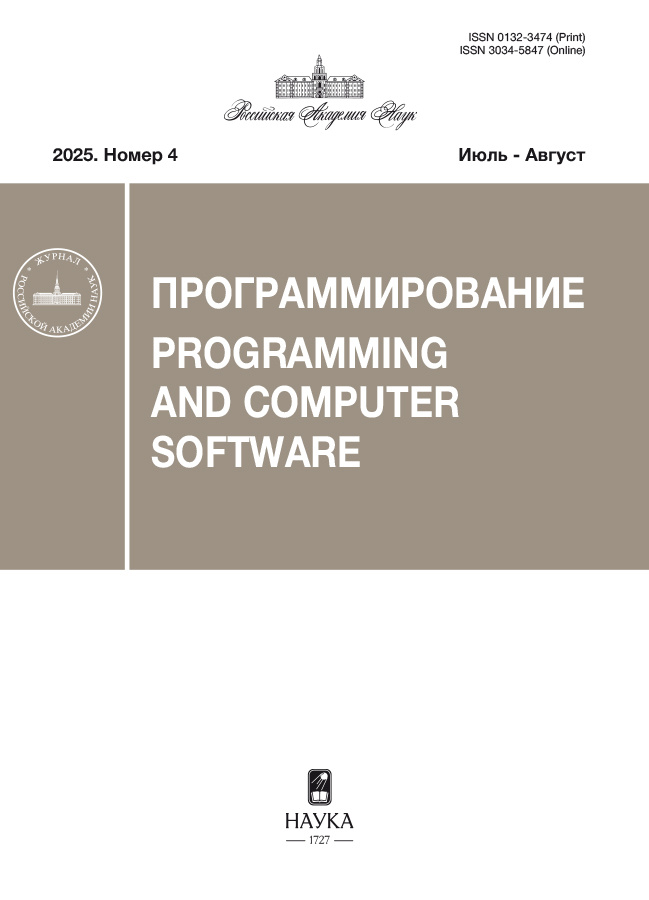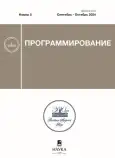Совместное использование сопрограмм и событий для программирования встроенных систем
- Авторы: Минин П.В.1
-
Учреждения:
- ООО “КБ “ДОРС”
- Выпуск: № 5 (2024)
- Страницы: 14-30
- Раздел: ПАРАЛЛЕЛЬНОЕ И РАСПРЕДЕЛЕННОЕ ПРОГРАММИРОВАНИЕ
- URL: https://gynecology.orscience.ru/0132-3474/article/view/683329
- DOI: https://doi.org/10.31857/S0132347424050027
- EDN: https://elibrary.ru/OMADOW
- ID: 683329
Цитировать
Полный текст
Аннотация
Предложена новая методология построения программ для встроенных систем реального времени. Программа, написанная на языке C/C++, исполняется без помощи операционной системы и позволяет реализовать как событийно-ориентированный подход, так и параллельное выполнение с помощью сопрограмм. Обработка событий и выполнение сопрограмм производится в ядре мягкого реального времени на уровне приоритета программных прерываний. Сопрограмма рассматривается как частный случай события, где возобновляемая функция сопрограммы выполняется в качестве обработчика события. Для возобновления сопрограммы после приостановки ее событие повторно отправляется на обработку, до тех пор пока возобновляемая функция не будет полностью выполнена. Таким образом, в ядре происходят как обработка простых событий, так и планирование выполнения сопрограмм. Событиям могут назначаться различные приоритеты обработки. Ядро мягкого реального времени может быть расширено для работы в симметричной многопроцессорной системе. Сочетание сопрограмм и простых событий позволяет реализовать технологию fork/join, а также средства параллельного программирования, сходные с инструментами языков Go и occam. Новая методология была воплощена на языке C++ в виде библиотеки DORSECC, адаптированной для различных процессоров ARM и Blackfin. С ее помощью были созданы встроенные вычислительные системы реального времени, применяемые в серийно выпускаемых машинах для сортировки банкнот. Эти системы используются как для распознавания образов методом каскада классификаторов, так и для управления датчиками и приводами механизма с применением автоматного программирования. Их общее количество в эксплуатации превысило 20000. Ядро мягкого реального времени в указанных системах обеспечивает среднюю длительность обработки события на уровне десятков микросекунд при субмикросекундных накладных затратах.
Полный текст
Об авторах
П. В. Минин
ООО “КБ “ДОРС”
Автор, ответственный за переписку.
Email: p.minin@dors.ru
Россия, Москва
Список литературы
- Knuth D. The Art of Computer Programming: Fundamental Algorithms. Addison-Wesley, Reading, Massachusetts, the USA. 1997. P. 193–200.
- Dunkels A., Schmidt O., Voigt T., Ali M. Protothreads: Simplifying Event-Driven Programming of MemoryConstrained Embedded Systems. Proceedings of the Fourth ACM Conference on Embedded Networked Sensor Systems (SenSys 2006), Boulder, Colorado, the USA, November 2006.
- Libtask: a Coroutine Library for C and Unix. https://swtch.com/libtask/. Accessed 21.03.2023.
- The Boost C++ Libraries. Chapter 51: Boost.Coroutine. https://theboostcpplibraries.com/boost.coroutine. Accessed 21.03.2023.
- The Boost C++ Libraries. Chapter 32: Boost.Asio. https://theboostcpplibraries.com/boost.asio. Accessed 21.03.2023.
- CO2 Coroutine. https://github.com/jamboree/co2. Accessed 21.03.2023.
- Goodspeed N. Stackful Coroutines and Stackless Resumable Functions. The C++ Standards Committee – ISOCPP Document N4232. December 13, 2014. https://www.open-std.org/jtc1/sc22/wg21/docs/papers/2014/n4232.pdf.
- Belson B., Holdsworth J., Xiang W., Philippa B. A Survey of Asynchronous Programming Using Coroutines in the Internet of Things and Embedded Systems. ACM Transactions on Embedded Computer Systems. April 2019. V. 18. № 3. Article 21. https://doi.org/10.1145/3319618.
- Moskała M. Kotlin Coroutines: Deep Dive. Kt. Academy, Warsaw, Poland. 2022.
- FreeRTOS Kernel. Co-routines. https://www.freertos.org/croutine.html. Accessed 01.11.2023.
- Шалыто А.А. Парадигма автоматного программирования. Научно-Технический вестник ИТМО. 2008. Выпуск 53: Автоматное программирование.
- Ousterhout J. Why Threads are a Bad Idea (for most purposes). January 1996. USENIX Winter Technical Conference, San Diego, California, the USA.
- Lee E. The Problem with Threads. Computer. 2006. V. 39. P. 33–42.
- Samek M. Who Moved My State? Dr. Dobb’s (online). April 1, 2003. https://drdobbs.com/who-moved-my-state/184401643
- Samek M. Practical Statecharts in C/C++: Quantum Programming for Embedded Systems. CMP Books, San-Francisco, the USA. 2002.
- Gamma E., Helm R., Johnson R., Vlissides J. Design Patterns: Elements of Reusable Object-Oriented Software. Addison-Wesley, Reading, Massachusetts, the USA. 1995. P. 293.
- Kernel-Mode Driver Architecture Design Guide: Introduction to DPC Objects. https://learn.microsoft.com/en-us/windows-hardware/drivers/kernel/introduction-to-dpc-objects. Accessed 21.03.2023.
- Deferred Work – The Linux Kernel Documentation. https://linux-kernel-labs.github.io/refs/heads/master/labs/deferred_work.html. Accessed 21.03.2023.
- Nicholl R.A. A Specification of Modula-2 Process (Coroutine) Management. Journal of Pascal, Ada & Modula-2. 1988. V. 7. № 5. P. 16–22.
- Tatham S. Coroutines in C (online). https://www.chiark.greenend.org.uk/~sgtatham/coroutines.html. 2000.
- Dunkels A., Grönvall B., Voigt T. Contiki – A Lightweight and Flexible Operating System for Tiny Networked Sensors. Proceedings of the Conference on Local Computer Networks. 2004. P. 455–462. https://doi.org/10.1109/LCN.2004.38
- Barnett D., Massa A. Inside the uIP Stack. Dr Dobbs Journal (online). February 1, 2005. https://www.drdobbs.com/inside-the-uip-stack/184405971
- Dunkels A. Programming Memory-Constrained Networked Embedded Systems. Swedish Institute of Computer Science Doctoral Thesis (online). SICS Dissertation Series 47. February 2007. http://www.diva-potal.org/smash/get/diva2:1041306/FULLTEXT01.pdf
- Perlis A. Epigrams on programming. ACM SIGPLAN Notices. September 1982. V. 17. № 9. P. 7–13. https://doi.org/10.1145/947955.1083808
- McCool M., Reinders J., Robison A. Structured Parallel Programming: Patterns for Efficient Computation. Morgan Kaufmann, Burlington, Massachusetts, the USA. 2012. P. 209–252.
- Cox-Buday K. Concurrency in Go. O’Reily Media, Sebastopol, California, the USA. 2017.
- Roscoe A., Hoare C.A.R. The Laws of Occam Programming. Theoretical Computer Science. 1988. V. 60. P. 177–229. https://doi.org/10.1016/0304-3975(88)90049-7
- Hoare C.A.R. Communicating sequential processes. Prentice-Hall, Englewood Cliffs, New Jersey, the USA. 1985.
- Lampson B.W., Redell D.D. Experience with processes and monitors in Mesa. Comm. of the ACM. 1980. V. 23. № 2. P. 105–117.
- Love R. CPU Affinity. Linux Journal (online). July 1, 2003. https://www.linuxjournal.com/article/6799
- Gujarati A., Cerqueira F., Brandenburg B. Multiprocessor real-time scheduling with arbitrary processor affinities: from practice to theory. Real-Time Systems. 2015. V. 51. P. 440–483. https://doi.org/10.1007/s11241-014-9205-9
- Hoberock J., Garland M., Kohloff C. et al. A Unified Executors Proposal for C++. The C++ Standards Committee – ISOCPP Document P0443R14. September 15, 2020. https://www.open-std.org/jtc1/sc22/wg21/docs/papers/2020/p0443r14.html
- Bell J. Threaded code. Communications of the ACM. 1973. V. 16. № 6. P. 370–372. https://doi.org/10.1145/362248.362270.
- Rather E., Colburn D., Moore C. The evolution of Forth. In: History of programming languages – II. ACM Other Books. 1 January 1996. P. 625–670. https://doi.org/10.1145/234286.1057832 ISBN 9780201895025
- Reid G. Thinking in PostScript. Addison-Wesley, Reading, Massachusets, the USA. 1990. P. 105–118.
Дополнительные файлы











